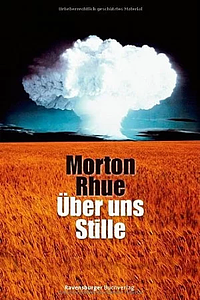You need to sign in or sign up before continuing.
Take a photo of a barcode or cover
I loved this book! The author portrays how people can act so diversely when put into a terrifying stressful situation. The reader sees a range of emotions and reactions; everything from kindness and empathy, to self preservation and greed. I couldn't put this one down.
I previewed this to use with my middle school students as we study the Cold War. This book has a really interesting premise and I think is a great look at the psychology of what happens when individuals are confronted with the threat of death. Unfortunately, there were a few too many inappropriate references for me to share this book with my middle schoolers. One character in particular is a Peeping Tom obsessed with sexual references and has a father who offers the teenage protagonist alcohol while reading a Playboy magazine in front of him. I understand that these moments were somewhat necessary to set up the moral failings inherent in this family but they are still not things I’m ready to expose my kids to.
This was a thought-provoking and compelling read. I love this author's previous offerings, and Fallout didn't disappoint. Set during the Cold War, it poses the question: "what if your family was the only one in the neighborhood with a bomb shelter, and the unthinkable happens?"
What if the Cuban Missile Crisis had not been peacefully resolved? What if the Soviets had detonated nuclear bombs over Long Island? And what if your family was the only one with a bomb shelter? This is the premise of Todd Strasser's book.
But this is not a philosophical treatise. We aren't asked actually asked "what would you do if...". Rather, we are presented with the situation as it is, and through Strasser's very vivid writing, asked to put ourselves in the shelter and experience it through Scott's eyes.
Neither is this a political treatise. Strasser keeps the focus so tight on Scott, his first-person narrator, that we can't even quite tell what's going on politically or militarily. We only know tensions are rising on the world stage. It's a very realistic portrayal of how the world looked to a 12 year old in 1962, but the technique has it's pitfalls as well, the biggest one being that I am not 12 years old and would have liked a bit more insight into what was going on in the wider world.
Although this lack of information bothered me while I was reading the book, looking back, it seems almost a nitpicky complaint about a book that is so strong and readable.
But this is not a philosophical treatise. We aren't asked actually asked "what would you do if...". Rather, we are presented with the situation as it is, and through Strasser's very vivid writing, asked to put ourselves in the shelter and experience it through Scott's eyes.
Neither is this a political treatise. Strasser keeps the focus so tight on Scott, his first-person narrator, that we can't even quite tell what's going on politically or militarily. We only know tensions are rising on the world stage. It's a very realistic portrayal of how the world looked to a 12 year old in 1962, but the technique has it's pitfalls as well, the biggest one being that I am not 12 years old and would have liked a bit more insight into what was going on in the wider world.
Although this lack of information bothered me while I was reading the book, looking back, it seems almost a nitpicky complaint about a book that is so strong and readable.
I'm having a tough time coming up with an opinion about this book. It grabbed me from the beginning and I didn't want to put the book down. However, once I got to the end I was left with too many questions. As a middle grade book, Strasser did a great job imagining what life in a bomb shelter would look like.
Really enjoyed this alternate history take on the Cold War.
The chapters rotated back and forth between before bombs dropped and after they dropped. It was a story about humanity, sacrifice, and family. There were a couple loose ends that weren't tied up as neatly as I would have liked, but it was well written and captivating.
The chapters rotated back and forth between before bombs dropped and after they dropped. It was a story about humanity, sacrifice, and family. There were a couple loose ends that weren't tied up as neatly as I would have liked, but it was well written and captivating.
can I just say how much I love this cover? it's so cute! does it remind anyone of I spy books? anyways, I also loved the book! the time switches added so much and it delves so deep into his past life and his family. he changed so much during those two weeks, it was incredible. I also think he discovered so much about his life and why he chose to act certain ways. this book was so well written!
I should have known based on other reviews suggesting this title for fans of Z for Zachariah that it wasn't going to be for me. I initially came across this book in a group suggesting alternative history titles for a reading challenge and it seemed...IDK...less actiony and less sci-fi than so many other alt histories out there. But in trying to pick an "easier" YA title, I ended up with one that was super stressful. The Bomb is dropped and only one family in the neighborhood has a bomb shelter. You will not be surprised that things don't go well.
This book alternates chapters between After the Bomb and the weeks leading up to it. The before chapters mostly set the stage of the relationships between Scott's parents, between Scott's dad and the rest of the neighborhood, and the friendship he shares with neighbor boy Ronnie. The mostly mundane 1960s neighborhood setting is so prosaic, that in comparison the After chapters are tense, fraught, and anxiety inducing.
I guess I'm glad I finished it, but the tone seemed especially menacing considering its a YA title.
This book alternates chapters between After the Bomb and the weeks leading up to it. The before chapters mostly set the stage of the relationships between Scott's parents, between Scott's dad and the rest of the neighborhood, and the friendship he shares with neighbor boy Ronnie. The mostly mundane 1960s neighborhood setting is so prosaic, that in comparison the After chapters are tense, fraught, and anxiety inducing.
I guess I'm glad I finished it, but the tone seemed especially menacing considering its a YA title.
reflective
slow-paced
Plot or Character Driven:
Character
Strong character development:
Yes
Loveable characters:
Yes
Diverse cast of characters:
No
Flaws of characters a main focus:
Yes



